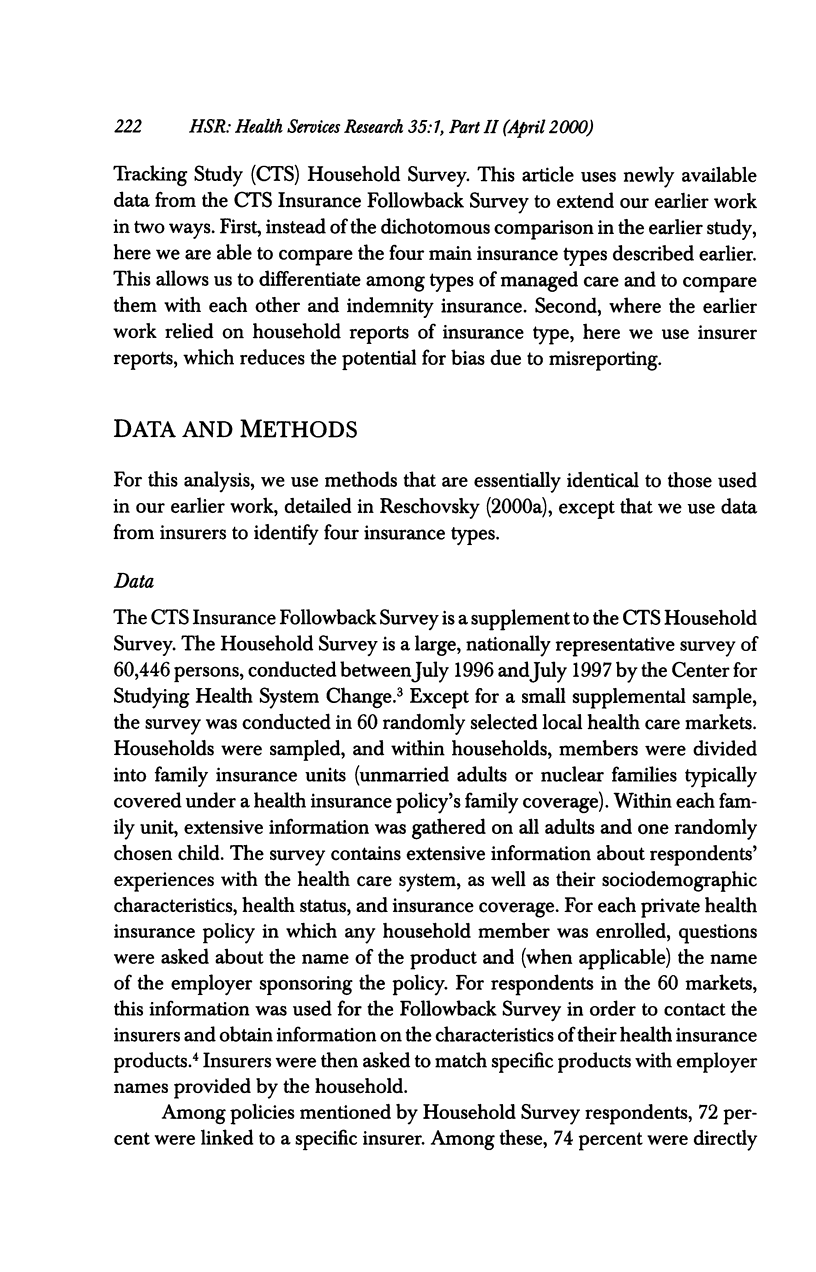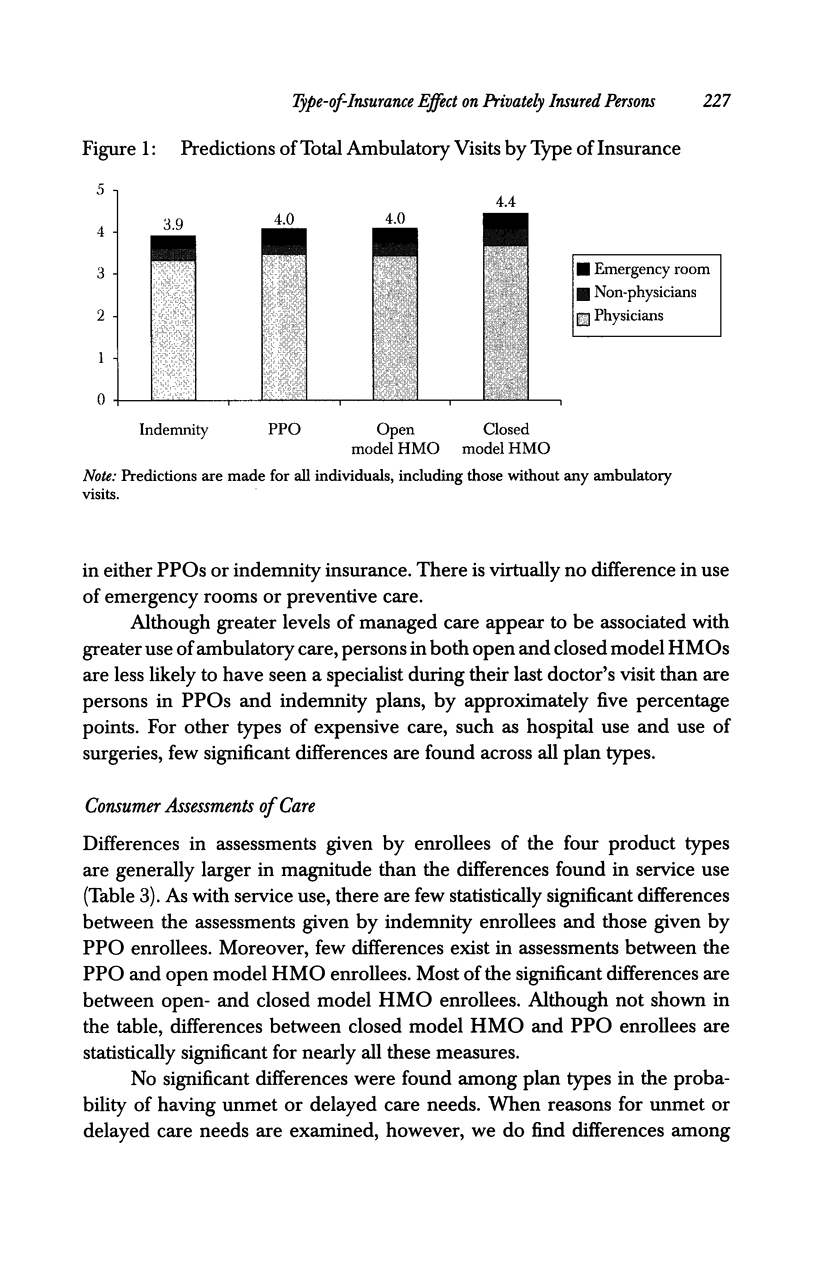Abstract
OBJECTIVE: To inform the debate about managed care by examining how different types of private insurance-indemnity insurance, PPOs, open model HMOs, and closed model HMOs-affect the use of health services and consumer assessments of care. DATA SOURCES/DATA COLLECTION: The 1996-1997 Community Tracking Study Household Survey, a nationally representative telephone survey of households, and the Community Tracking Study Insurance Followback Survey, a supplement to the Household Survey, which asks insurance organizations to match household respondents to specific insurance products. The analysis sample includes 27,257 nonelderly individuals covered by private insurance. STUDY DESIGN: Based on insurer reports, individuals are grouped into one of the four insurance product types. Measures of service use include ambulatory visits, preventive care use, hospital use, surgeries, specialist use, and whether there is a usual source of care. Consumer assessments of care include unmet or delayed care needs, satisfaction with health care, ratings of the last physician visit, and trust in physicians. Estimates are adjusted to control for differences in individual characteristics and location. PRINCIPAL FINDINGS: As one moves from indemnity insurance to PPOs to open model HMOs to closed model HMOs, use of primary care increases modestly but use of specialists is reduced. Few differences are observed in other areas of service use, such as preventive care, hospital use, and surgeries. The likelihood of having unmet or delayed care does not vary by insurance type, but the reasons that underlie such access problems do vary: enrollees in more managed products are less likely to cite financial barriers to care but are more likely to perceive problems in provider access, convenience, and organizational factors. Consumer assessments of care-including satisfaction with care, ratings of the last physician visit, and trust in physicians-are generally lower under more managed products, particularly closed model HMOs. CONCLUSIONS: The type of insurance that people have-not just whether it is managed care but the type of managed care-affects their use of services and their assessments of the care they receive. Consumers and policymakers should be reminded that managed care encompasses a variety of types of insurance products that have different effects and may require different policy responses.
Full text
PDF


















Images in this article
Selected References
These references are in PubMed. This may not be the complete list of references from this article.
- Blendon R. J., Benson J. M., Brodie M., Altman D. E., James M., Hugick L. Voters and health care in the 1998 election. JAMA. 1999 Jul 14;282(2):189–194. doi: 10.1001/jama.282.2.189. [DOI] [PubMed] [Google Scholar]
- Brodie M., Brady L. A., Altman D. E. Media coverage of managed care: is there a negative bias? Health Aff (Millwood) 1998 Jan-Feb;17(1):9–25. doi: 10.1377/hlthaff.17.1.9. [DOI] [PubMed] [Google Scholar]
- Gawande A. A., Blendon R., Brodie M., Benson J. M., Levitt L., Hugick L. Does dissatisfaction with health plans stem from having no choices? Health Aff (Millwood) 1998 Sep-Oct;17(5):184–194. doi: 10.1377/hlthaff.17.5.184. [DOI] [PubMed] [Google Scholar]
- Gold M. R., Hurley R., Lake T., Ensor T., Berenson R. A national survey of the arrangements managed-care plans make with physicians. N Engl J Med. 1995 Dec 21;333(25):1678–1683. doi: 10.1056/NEJM199512213332505. [DOI] [PubMed] [Google Scholar]
- Gordon N. P., Rundall T. G., Parker L. Type of health care coverage and the likelihood of being screened for cancer. Med Care. 1998 May;36(5):636–645. doi: 10.1097/00005650-199805000-00004. [DOI] [PubMed] [Google Scholar]
- Hillman A. L. Mediators of patient trust. JAMA. 1998 Nov 18;280(19):1703–1704. doi: 10.1001/jama.280.19.1703. [DOI] [PubMed] [Google Scholar]
- Kao A. C., Green D. C., Zaslavsky A. M., Koplan J. P., Cleary P. D. The relationship between method of physician payment and patient trust. JAMA. 1998 Nov 18;280(19):1708–1714. doi: 10.1001/jama.280.19.1708. [DOI] [PubMed] [Google Scholar]
- Kemper P., Reschovsky J. D., Tu H. T. Do HMOs make a difference? Summary and implications. 1999-00 WinterInquiry. 36(4):419–425. [PubMed] [Google Scholar]
- Lake T. Do HMOs make a difference? Consumer assessments of health care. 1999-00 WinterInquiry. 36(4):411–418. [PubMed] [Google Scholar]
- Mark T., Mueller C. Access to care in HMOs and traditional insurance plans. Health Aff (Millwood) 1996 Winter;15(4):81–87. doi: 10.1377/hlthaff.15.4.81. [DOI] [PubMed] [Google Scholar]
- Miller R. H., Luft H. S. Does managed care lead to better or worse quality of care? Health Aff (Millwood) 1997 Sep-Oct;16(5):7–25. doi: 10.1377/hlthaff.16.5.7. [DOI] [PubMed] [Google Scholar]
- Reschovsky J. D. Do HMOs make a difference? Data and methods. 1999-00 WinterInquiry. 36(4):378–389. [PubMed] [Google Scholar]
- Reschovsky J. D., Kemper P. Do HMOs make a difference? Introduction. 1999-00 WinterInquiry. 36(4):374–377. [PubMed] [Google Scholar]
- Rubin H. R., Gandek B., Rogers W. H., Kosinski M., McHorney C. A., Ware J. E., Jr Patients' ratings of outpatient visits in different practice settings. Results from the Medical Outcomes Study. JAMA. 1993 Aug 18;270(7):835–840. [PubMed] [Google Scholar]
- Safran D. G., Tarlov A. R., Rogers W. H. Primary care performance in fee-for-service and prepaid health care systems. Results from the Medical Outcomes Study. JAMA. 1994 May 25;271(20):1579–1586. [PubMed] [Google Scholar]
- Tu H. T., Kemper P., Wong H. J. Do HMOs make a difference? Use of health services. 1999-00 WinterInquiry. 36(4):400–410. [PubMed] [Google Scholar]



